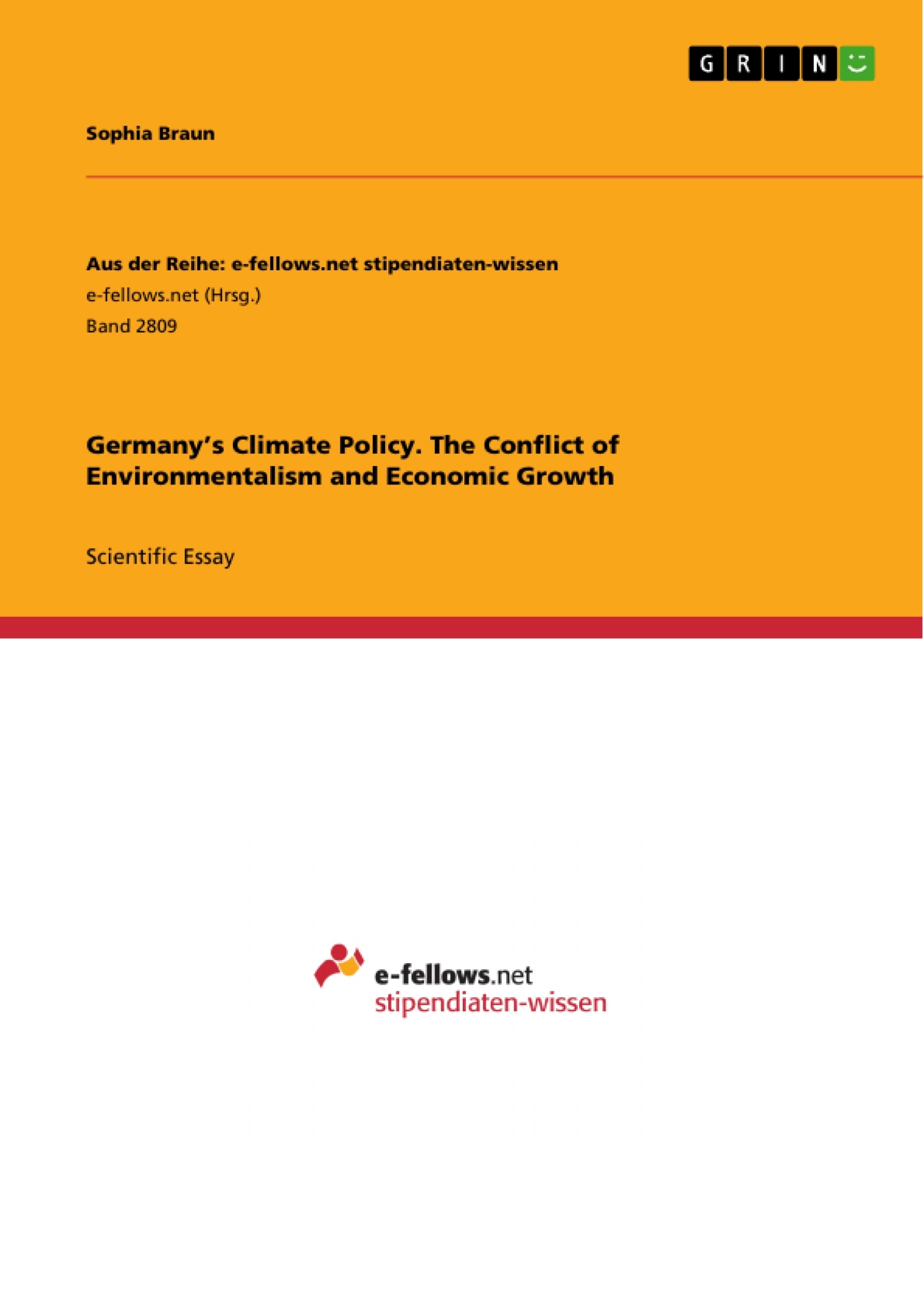This essay seeks to describe, analyze and evaluate Germany’s climate policy in order to argue that it is effective and progressive on a global scale, but also subject to trade-offs as Germany is a highly industrialized economy. Germany is chosen as it is an especially interesting case in the apparent conflict of environmentalism and economic growth. The essay firstly outlines a literature review. An overview of the state of climate policy in Germany is given, major current policies are explained, and (geo)political, economic and cultural factors that influence climate policy are described. Within the literature review, the researcher decides to focus on policies related to renewable energies, energy efficiency, information campaigns and innovation. Germany’s membership in the European Union (EU) was identified as major geopolitical influence, local governance structures and the German green party as influencing political factors, and the fossil fuels, automotive, machinery and equipment as well as the cattle farming industries as influencing economic factors. In the absence of a proper research body on the relationship of German culture and its climate policy, cultural factors were deducted from the aforementioned sub-sections. Subsequently, the essay attempts to answer the question why Germany’s climate policy is designed the way it is and evaluates its performance. Finally, a conclusion is drawn.
The researcher finds that Germany’s climate policy is indeed successful, however especially the fossil fuel, automotive and cattle farming industries have substantial influence. These sectors are still subsidized and not directly tackled in the interest of climate policy, even though their contributions to greenhouse gas emission are substantial.
Table of Contents
- Introduction
- Description of Germany's climate policy
- Overview
- Current policies
- Geopolitical factors
- Political factors
- Economic factors
- Cultural factors
- Analysis and evaluation of Germany's climate policy
- Conclusion
Objectives and Key Themes
This essay aims to provide a comprehensive description, analysis, and evaluation of Germany's climate policy. It argues that, despite its effectiveness and progressive nature on a global scale, the policy faces trade-offs due to Germany's highly industrialized economy. Germany serves as an interesting case study for the apparent conflict between environmentalism and economic growth. The essay explores the factors shaping Germany's climate policy, including geopolitical, political, economic, and cultural influences, highlighting the country's commitment to renewable energy sources and energy efficiency.
- Germany's climate policy in the context of its industrialized economy.
- Analysis of the factors influencing Germany's climate policy.
- Evaluation of the effectiveness and progressiveness of Germany's climate policy.
- The role of renewable energy sources and energy efficiency in Germany's climate policy.
- The challenges and trade-offs associated with balancing environmentalism and economic growth.
Chapter Summaries
- Introduction: This chapter introduces the essay's objectives, focusing on describing, analyzing, and evaluating Germany's climate policy. It highlights the country's significance as a case study for the intersection of environmentalism and economic growth.
- Description of Germany's climate policy: This section delves into the current state of Germany's climate policy, outlining its key features, major policies, and influential factors. It covers topics such as renewable energy sources, energy efficiency, information campaigns, and innovation.
- Geopolitical factors: This chapter explores the influence of Germany's membership in the European Union (EU) on its climate policy, highlighting the importance of energy issues in EU integration and the interplay between national and EU regulations.
- Political factors: This section examines the role of local governance structures and the German green party in shaping Germany's climate policy, emphasizing the impact of federalism and local self-administration.
- Economic factors: This chapter discusses the influence of various industries, such as fossil fuels, automotive, machinery and equipment, and cattle farming, on Germany's climate policy, highlighting the challenges of reconciling economic interests with environmental goals.
- Cultural factors: This chapter delves into the role of cultural factors in shaping Germany's climate policy, drawing insights from previous sub-sections.
Keywords
This research essay focuses on Germany's climate policy, examining its effectiveness and progressiveness in the context of a highly industrialized economy. Key themes include renewable energy sources, energy efficiency, geopolitical factors, political factors, economic factors, cultural factors, and the trade-offs between environmentalism and economic growth. The analysis explores the influence of the European Union, local governance structures, and key industries on Germany's climate policy.
Frequently Asked Questions
Is Germany's climate policy effective?
Germany's climate policy is considered progressive and successful on a global scale, particularly in promoting renewable energy. However, it faces challenges due to the country's status as a highly industrialized economy.
What are the main conflicts in German climate policy?
The central conflict lies between ambitious environmental goals and the desire for sustained economic growth. Industries like automotive, fossil fuels, and cattle farming exert significant influence, leading to political trade-offs.
What role does the EU play in Germany's climate strategy?
As a member of the European Union, Germany's climate policy is heavily influenced by EU regulations and integration goals. There is a constant interplay between national targets and broader European energy frameworks.
Which industries are most subsidized despite climate goals?
Despite the commitment to reducing greenhouse gases, sectors such as the automotive industry, fossil fuels, and cattle farming continue to receive subsidies or are not directly tackled to protect economic interests.
How do political factors like the Green Party influence policy?
The German Green Party and federalist governance structures play a major role in pushing for renewable energy and energy efficiency, often acting as a counterweight to industrial lobbying.
- Citar trabajo
- Sophia Braun (Autor), 2018, Germany’s Climate Policy. The Conflict of Environmentalism and Economic Growth, Múnich, GRIN Verlag, https://www.grin.com/document/437557



